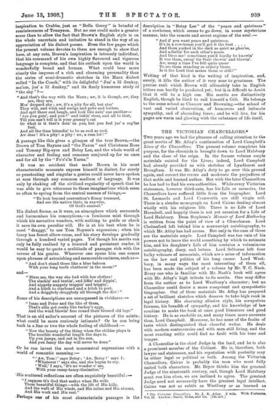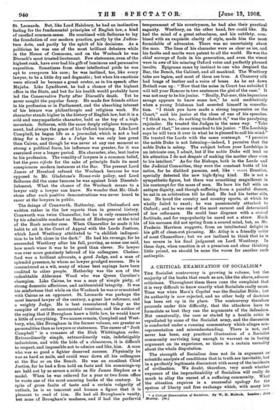THE VICTORIAN CHANCELLORS.*
Two years ago we had the pleasure of calling attention to the great merits of Mr. Atlay's continuation of Lord Campbell's Lives of the Chancellors. The present volume completes his purpose, for the chronicle is brought down to Lord Halsbury and the close of the reign. In the former volume ample materials existed for the Lives; indeed, Lord Campbell had already provided us with sketches of Lyndhurst and Brougham. It was Mr. Atlay's duty to go over this ground again, and correct the errors and moderate the prejudices of that noble and learned author. But with the later Chancellors he has had to find his own authorities. While every Victorian statesman, however third-rate, has his Life or memoirs, the Chancellors have suffered little from the biographer. Lord St. Leonards and Lord Cranworth are still virgin soil. There is a slender monograph on Lord Cairns dealing almost wholly with his religious life. There is no Life of Lord Herschell, and happily there is not yet occasion for a Life of Lord Halsbury. Dean Stephens's Memoir of Lord Hatherley is written from the point of view of a Churchman. Lord Chelmsford left behind him a manuscript autobiography, to which Mr. Atlay has had access. But only in the case of three are the materials ample. Lord Campbell was too vain of his powers not to leave the world something by which to estimate him, and his daughter's Life of him contains a voluminous autobiography, diary, and letters. Lord Selborne left four bulky volumes of memorials, which are a mine of information on the law and politica of his long career. Lord West- bury, in many ways the most interesting of them all, has been made the subject of a volume by Mr. T. 0. Nash. Every one who is familiar with Mr. Nash's book will agree with Mr. Atlay's high tribute to its merits. One may differ from the author as to Lord Westbury's character; but no Chancellor could desire a more competent and sympathetic biographer. Out of these materials Mr. Atlay has prepared a set of brilliant sketches which deserve to take high rank in legal history. His charming allusive style, his scrupulous fairness, his breadth of sympathy, and his knowledge of law combine to make the book at once good literature and good history. He is as readable as, and many times more accurate than, Lord Campbell. Moreover, he has none of the faults of taste which distinguished that cheerful writer. He deals with modern controversies and with men still living, and the most exacting critic could find no fault with his tone and temper. A Chancellor is the chief Judge in the land, and he is also a prominent member of the Cabinet. He is, therefore, both lawyer and statesman, and his reputation with posterity may be either legal or political or both. Among the Victorian Chancellors, Cairns is probably the man who most fully united both characters. Mr. Bryce thinks him the greatest Judge of the nineteenth century, and, though Lord Halsbury must run him close, we are inclined to agree. The greatest Judge need not necessarily have the greatest legal intellect. Cairns was not as subtle as Westbury or as learned as • The Victorian Chancel/ors. By J. B. Atlay. 2 vols. With Portraits', Vol. IL London: Smith, Elder, and Co. [14s. net.] St. Leonard& But, like Lord Halsbury, he bad an instinctive feeling for the fundamental principles of English law, a kind of rarefied common-sense. He combined with Selborne to lay the foundation of our modern practice, partly by the Judica- ture Acts, and partly by the spirit of his decisions. As a politician he was one of the most brilliant debaters while in the House of Commons, and on the Woolsack he was Disraeli's most trusted lieutenant. Few statesmen, even of the highest rank, have ever had his gift of luminous and persuasive exposition. Sometimes from sheer intellectual pride be was apt to overprove his case; he was inclined, too, like every lawyer, to be a little dry and dogmatic ; but when his emotions were stirred he became a great orator, as in his speech after Majuba. Like Lyndhurst, he bad a chance of the highest office in the State, and but for his health would probably have led the Conservative Party after Disraeli's death. Yet he never caught the popular fancy. He made few friends either in his profession or in Parliament, and the absorbing interest of his leisure was philanthropic and religious work. No character stands higher in the history of English law, but it is a cold and unsympathetic character, bald as the top of a high mountain. Selborne, with the same deeply religious tempera- ment, had always the grace of his Oxford training. Like Lord Campbell, be began life as a journalist, which is not a bad thing for a lawyer. As a Judge be was only less great than Cairns, and though he was never at any one moment so strong a political force, his influence was greater, for it was exercised over a longer period. His character, also, lent lustre to his profession. The venality of lawyers is a common belief, bnt the gran rijiato for the sake of principle finds its most conspicuous modern instances at the Bar. The present. Lord James of Hereford refused the Woolsack because he was opposed to Mr. Gladstone's Home-rule policy, and Lord Selborne did the same because he was against Irish Disestab- lishment. What the chance of the Woolsack means to a lawyer only a lawyer can know. No wonder that Mr. Glad- stone after such positive demonstrations was never heard to sneer at the lawyers in public.
The doings of Cranworth, Hatherley, and Chelmsford are written rather in the law reports than in general history. Cranworth was twice Chancellor, but be is only remembered by his admirable conduct as Baron of Exchequer at the trial of the Rush murder case. When Chancellor he made it his habit to sit in the Court of Appeal with the Lords Justices, which Lord Westbury attributed to "a childish indisposi- tion to be left alone in the dark." He had his revenge; for he succeeded Westbury after his fall, proving, as some one said, how much wiser it was to be good than clever. No lawyer was ever more genuinely beloved of his colleagues. Chelms- ford was a brilliant advocate, a good Judge, and a man of splendid presence, to whom no lawyer grudged success. He is remembered as a wit, many of whose best sayings have been credited to other people. Hatherley was the son of the redoubtable Alderman Wood who was Queen Caroline's champion. Like Cairns, he was a man of simple piety, of strong domestic affections, and unblemished-integrity. It was his misfortune that while on the Woolsack he was overmatched with Cairns as an opponent. St. Leonards was perhaps the most learned lawyer of the century, a great law reformer, and a weighty Judge. He is best remembered to-day as the compiler of certain monumental treatises, and the author of the saying that if Brougham knew a little law, he would know a little of everything. Two names remain, Campbell and West- bury, who, like Brougham in the former volume, are greater as personalities than as lawyers or statesmen. The career of " Jock Campbell" is a romance of the Dick Whittington order. Extraordinarily simple, extraordinarily vain, indefatigably industrious, and with the hide of a rhinoceros, it is difficult to respect, and impossible not to admire and like, him. A man who was so good a fighter deserved success. Physically he was as hard as nails, and could wear down all his colleagues at the Bar or on the Bench. He was an excellent Chief Justice, for he had a firm hold on facts and his summings-up are held out by so severe a critic as Sir James Stephen as a model. When he was relieved for a year or two from office he wrote one of the most amusing books of the century. In spite of gross faults of taste and a certain vulgarity of outlook, he is so innocent and human a figure that it is pleasant to read of him. He had all Brougham's vanity, but none of Brougham's madness, and if had the perfervid temperament of his countrymen, be had also, their practical sagacity. Westbury, on the other hand, few could like. He bad the mind of a great schoolman, and his subtlety, com- bined with an exquisite • clarity of style, made him the most formidable of advocates. There was no uncertainty about the man. The lines of his character were as clear as ice, and his faults and merits were patent to all the world. He was the chief scourge of fools in his generation, and even the wisest were in awe of his mincing Oxford voice and perfectly phrased insults. Epigrams came by instinct to one who despised the Bar, the Bench, the Cabinet, and all mankind. The Westbury tales are legion, and most of them are true. A Chancery silk had lungs of leather and a voice of brass. As he sat down Bethell rose up : " Now that the noise in Court has subsided I will tell your Honour in two sentences the gist of the case." It was not easy to be his junior. " Really, Pal-mer, this loquacious savage appears to know some law," be said meditatively when a young Irishman had asserted himself in consulta- tion. "I think you have made a strong impression on the Court," said his junior at the close of one of his speeches. "I think so, too; do nothing to disturb it," was the paralysing rejoinder. He treated the Judges in the same way. " Take a note of that," he once remarked to his junior. " His Lordship says he will turn it over in what he is pleased to call his mind." He treated the Lords with the same contempt. "I perceive the noble Duke is not listening—indeed, I perceive that the noble Duke is asleep. The subject before your Lordships is an intricate one, I admit, but if the noble Duke will lend us his attention I do not despair of making the matter clear even to his intellect." As for the Bishops, both in the Lords and the Judicial Committee, they were the constant butts of his
satire, for he disliked parsons, and, like stout Erastian, specially detested the new high-flying kind. He is not a sympathetic figure, but there was something magnificent in his contempt for the mass of men. He bore his fall with an antique dignity, and though suffering from a painful disease, he sat in an arbitration till he died. He had his better side, too. He loved the country and country sports, at which he wholly failed to excel ; he was passionately attached to Oxford ; and be was one of the most earnest and determined of law reformers. He could bear disgrace with a stoical fortitude, and for unpopularity he cared not a straw. Much of his sarcasm did not spring from a soured mind, but, as Mr. Frederic Harrison suggests, from an intellectual delight in his gift of clean-cut phrasing. Mr. Atlay is a friendly critic of most Chancellors ; but we are inclined to think that be is too severe in his final judgment on Lord Westbury. In these days, when emotion is at a premium and clear thinking little prized, we should be none the worse for another such antiseptic.







































 Previous page
Previous page